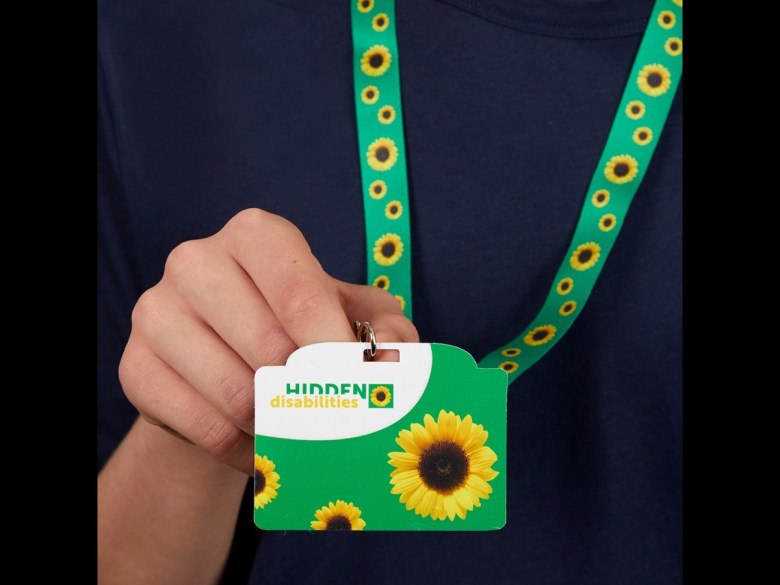A sunflower sticker on a shop window; an enamel sunflower pin on a colleague’s lapel; a bright sunflower lanyard adorning the neck of a customer.
The eagle-eyed amongst us may have noticed that sunflowers are springing up everywhere, spreading joy and hope. For those in the disability community, this is especially poignant.
The Hidden Disabilities Sunflower program promotes awareness of invisible disabilities. Staff at locations that have signed up to the program are expected to create a “sunflower-friendly” environment, one that is supportive, welcoming and understanding of disability. The sunflower acts as a symbol of this support, as well as a small token for those with hidden disabilities to signal their condition if they feel comfortable to do so.
Business training
There are two aspects to the program: one for businesses, and one for people with disabilities or their allies and supporters.
Individuals can wear a Sunflower to quietly share their disability status; businesses can publicly display them to show that they are welcoming of people with hidden disabilities, and able to provide appropriate support to customers who need it.
Sandee Facy, Head of Business Development Aus/NZ for the Hidden Disabilities Sunflower, told Link that the organisation keeps it simple for businesses and companies that wish to participate. Once they sign up, they have access to a seven-and-a-half minute awareness video about why someone might wear a sunflower. The video covers what the initiative is, what a hidden disability is and what they can do about it in their role in the business.
The Hidden Disabilities Sunflower program is worldwide, with many businesses having signed up since the program launched in 2016. This includes over 200 airports globally, railway networks, schools, universities, government agencies and healthcare services. In Australia, there are over 300 Sunflower members across various sectors serving the 80 to 85 per cent of Australians with disability whose condition is non-visible.
Businesses are able to ‘launch’ the program in their own way; some, Facy said, “shout it loud and proud” and let all customers and stakeholders know, while others choose to utilise the Sunflower as a workplace support initiative for colleagues.
Facy said the Hidden Disabilities Sunflower program also provides resources to help guide businesses on their disability awareness journey, including an index of over 900 non-visible disabilities and conditions and information on accommodations for employees with those conditions. Businesses also have access to quarterly webinars on disability-related topics, and the initiative often works with local advocacy organisations to produce these events.
A retail survey conducted by the Sunflower team showed that over 90 per cent of people would be more likely to visit a Sunflower-friendly destination, while up to 70 per cent check whether a venue recognises the Sunflower before visiting.
Subtle empowerment
In an empowering move for the disability community, in Brazil, the Sunflower has been legislated as the icon for invisible disabilities.
Facy said the symbol has been designed to empower those who show it, serving as a communication tool and conversation starter.
“There are a lot of reasons why someone would choose to wear a Sunflower. Some people are loud and proud, and others choose to use it a bit more discreetly,” she said.
“It empowers the wearer to seek support without having to disclose. It’s important to note that no one ever has to disclose why they wear the Sunflower.”
And it’s useful not just for customers, but also for employees of supportive businesses.
“It’s about normalising conversation within the workplace and having people feel comfortable working for an employer who is Sunflower-friendly. That’s what people are looking for these days – a more inclusive environment,” she said.
Those who wish to wear it can order one online from the Hidden Disabilities Sunflower website, or get one from a member location that provides them for free. To find out more, or to check whether a business or service near you is Sunflower-friendly visit the Hidden Disabilities Sunflower website: https://hdsunflower.com/au/

